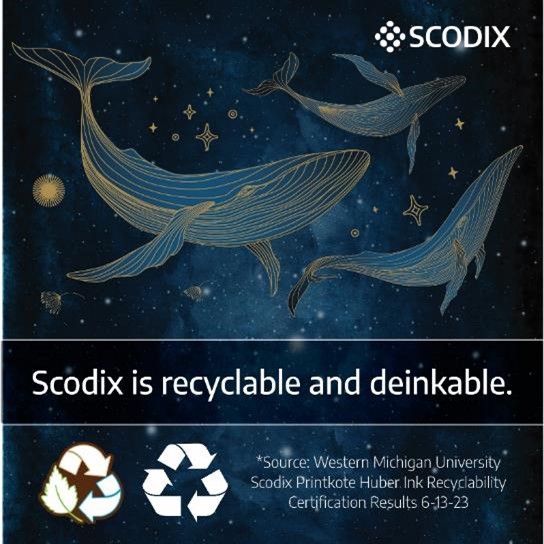
Press release submitted on behalf of Scodix
Scodix, the leading provider of digital embellishment solutions for the graphic arts industry, announces the successful completion of its latest recyclability tests, further reinforcing the company’s commitment to sustainability. The results demonstrate that Scodix embellishments can be repulped during the recycling process, allowing products enhanced with Scodix embellishments to carry the recyclable symbol.
Scodix EVP Global Sales & Marketing, Mark Nixon, comments, “Sustainability is a core pillar of our business operations. As such, we are thrilled to share our latest test results which underscore the positive impact Scodix products can have on building a more sustainable future. With our repulpability and recyclability certification coupled with our Life Cycle Assessment (LCA) findings, Scodix users can confidently embrace data-driven sustainability practices.
FTC guidelines require third party independent testing to allow manufacturers to use a recyclable symbol. Scodix worked with Western Michigan University (WMU) to implement the SBS Equivalency (WMU SBS-E) testing protocol, which models the Fiber Boxboard Associations (FBA) wax coating replacement protocol.
The testing was performed on 16pt SBS Printkote C1S paper with a fifteen percent coverage. Sheets were taken through the process of repulping, screening and cleaning to ensure that the digital embellishment would not inhibit the recycling process.
The tests produced positive results showcasing the recyclability of Scodix digitally embellished sheets. Passing the WMU SBS-E protocol proved that sheets with Scodix embellishment would qualify for recycling and could be repulped during the process. Brands and manufacturers using Scodix embellishment under this control protocol are able to use the FTC recycling symbol as long as the substrate used is also certified as recyclable.
“Today is a momentous day for Scodix, but our journey towards sustainability doesn’t end here,” affirms Nixon. ” Coupled with the commissioned LCA that clearly states that Scodix is over 7 times less harmful to the environment than the traditional foiling process, we believe the time is now to remain steadfast in our commitment to driving continuous improvements in sustainability – equipping manufacturers with the necessary data to accurately measure their processes.”
For more information about the testing process or to learn more about Western Michigan University standards, visit their website at http://wmupilotplant.com. The verifying documents for Scodix can be requested for download at www.scodix.com/sustainability.

